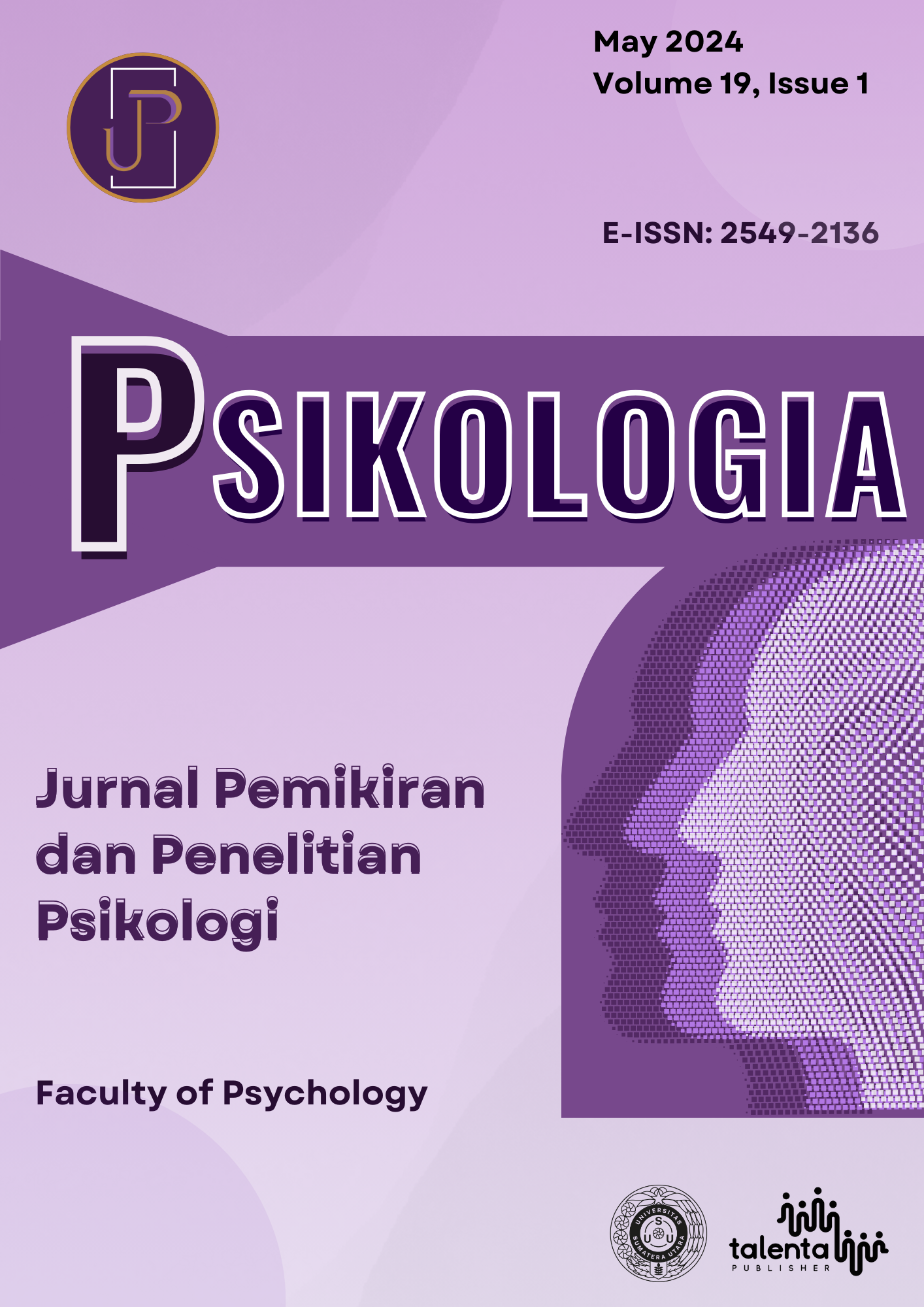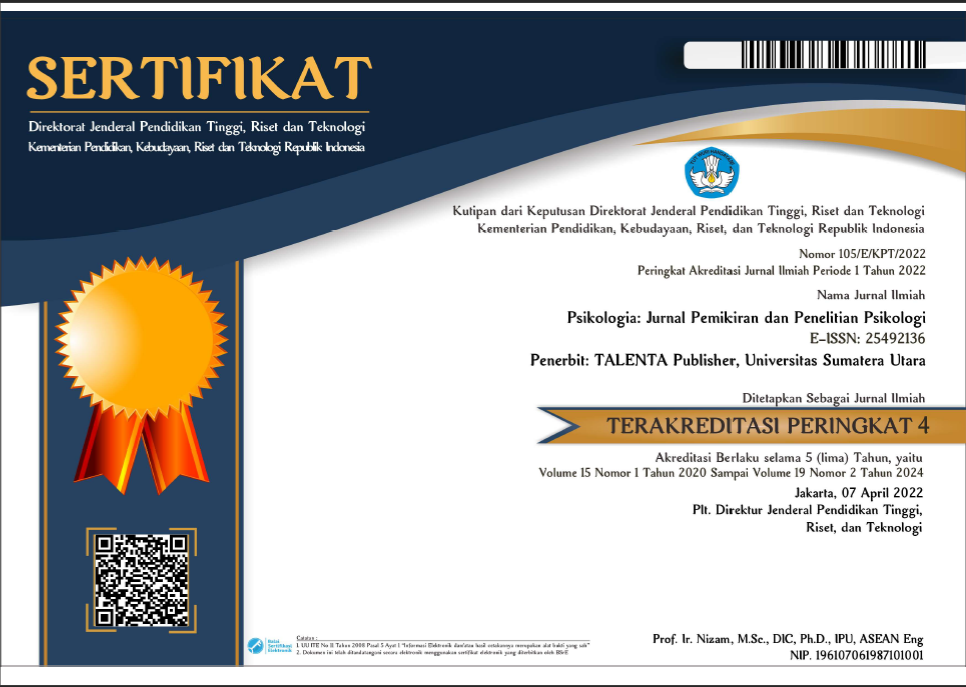Development of a training module for adolescent Peer Counsellors based on a systematic literature review
DOI:
https://doi.org/10.32734/psikologia.v19i1.14503Keywords:
adolescent peer counselors, systematic literature review, trainingAbstract
Adolescence is a critical phase in mental health, with 50% of severe mental disorders found to have an onset in adolescence. To prevent and detect early symptoms of mental disorders, school adolescent peer counseling programs have been formed since the 1970s. Peer counselors’ roles include providing emotional support for their peers through listening, helping as a co-problem solver, and, if needed, referring peers who need professional help to the professionals available at school. This project aims to develop a practical training module for student peer counselors and form a peer counselor program in the Special Region of Yogyakarta. The training module was formed through a systematic literature review of existing scientific literature. The literature results concluded that the main topics of peer counselor training are communication skills, attitudes, other skills, self-development skills, ethics, and focus topics. A training module was developed based on the results of a systematic literature review.
Downloads
References
Christner, R. W., & Mennuti, R. B. (2009). School-based mental health. New York: Routledge.
Dick, W., Carey, L., & Carey, J. O. (2015). The systematic design of instruction (Sixth edit). New Jersey: Pearson Education.
Erhamwilda. (2012). Model hipotetik â€peer counseling†dengan pendekatan realitas untuk siswa SLTA. Jurnal Ilmu Pendidikan, 15(2), 1-15. Diambil kembali dari http://ecampus.iainbatusangkar.ac.id/ojs/index.php/takdib/article/view/223/221
Henriksen, E. M. (1991). A peer helping program for the middle school. Canadian Journal of Counselling, 25(1), 12–18.
Kessler, R., Berglund, P., & demler, O. (2005). Lifetime prevalence and age of onset distributions of dsm-iv disorders in the national comorbidity survey replication. Archives of General Psychiary, 593-602.
Knopf, D., Park, M. J., & Mulye, T. P. (2008). The mental health of adolescents: A national profile. NAHIC , 1-15.
Kutcher, S. (2015). Teen mental health speaks. Retrieved Mei 2, 2016, from teenmentalhealth.org: http://teenmentalhealth.org/toolbox/teenmentalhealth-speaks-magazine/
McCann, B. G. (1975). Peer counselor: An approach to psychological education. Elementary School Guidance & Counseling, 9(3), 180-187. Diambil kembali dari http://www.jstor.org/stable/42868380
Mokdad, A. H., Forouzanfar, M. H., Daoud, F., Mokdad, A. A., El Bcheraoui, C., Moradi-Lakeh, M., ... & Kravitz, H. (2016). Global burden of diseases, injuries, and risk factors for young people's health during 1990–2013: a systematic analysis for the Global Burden of Disease Study 2013. The Lancet, 387(10036), 2383-2401.
Newton, F. B., & Ender, S. C. (2010). Students Helping Students. San Fransisco: Jossey-Bass A Willey Imprint.
Patel, V. (2012). Global mental health: from science to action. Harvard Review of Psychiatry, 20(1), 6-12.
Patton, G. C., Sawyer, S. M., Santelli, J. S., Ross, D. A., Afifi, R., Allen, N. B., ... & Kakuma, R. (2016). Our future: A Lancet Commission on adolescent health and wellbeing. The Lancet, 387(10036), 2423-2478.
Resnick, M. (2000). Protection, resiliency, and youth development. Adolescents Medicine: State of the Art Reviews , 157-164.
Soeroso, S. (2001). Masalah kesehatan remaja. Sari Pediatri , 190-198.
Santos, P. F., Wainberg, M. L., Caldas de Almeida, J. M., Saraceno, B., & Mari, a. J. (2015). Overview of mental health system in Mozambique: Addresing the treatment gap with a task-shifting strategy in primary care. International Journal of Mental Health System, 10(1), 1-9. doi:10.1186/s13033-015-0032-8
Surjaningrum, E. R. (2012). Gambaran mental health literacy kader kesehatan. INSAN , 194-202.
The World Bank. (2007). World Development Report 2007: Development and the next generation, The International Bank for Reconstruction and Development/The World Bank, Washington, DC.
WHO. (2003). Investing in mental health. Geneva: WHO.
Downloads
Published
How to Cite
Issue
Section
License
Copyright (c) 2024 Yuli Fajar Susetyo, Aliyaturrahmah Supriyadi, Diana Setiyawati, Nurul Kusuma Hidayati

This work is licensed under a Creative Commons Attribution-ShareAlike 4.0 International License.









